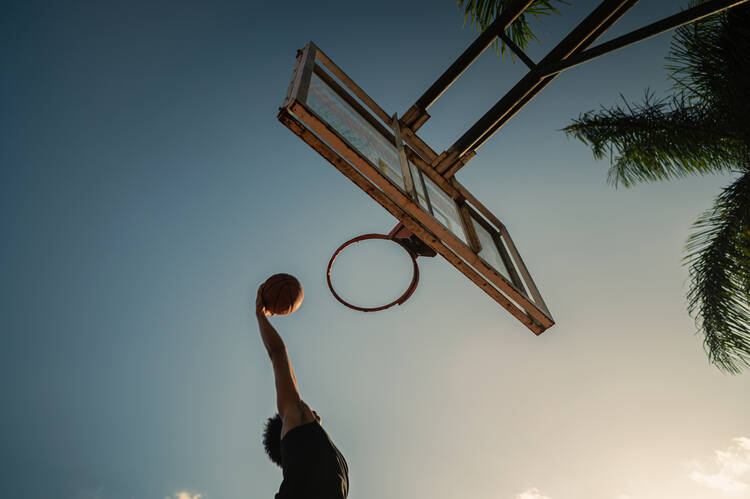The Catholic Movie Club is a short weekly essay pulling out spiritual themes in our favorite films. You can discuss the movies with other readers in the comments on this page or in our Facebook group. Find past Catholic Movie Club selections here.
February is Black History Month, and the Catholic Movie Club is going to focus on the work of Black directors. I have invited a friend to join me each week to discuss these films with me and to include Black voices in this series. I hope you enjoy our dialogues as much as I did!
Monica and Quincy are competitive basketball players whose drive to succeed often clashes with their feelings for each other.
We begin the month with a seminal Black love story: “Love & Basketball” (2000), written and directed by Gina Prince-Bythewood. The film spans 20 years in the relationship between Monica (Sanaa Lathan) and Quincy/Q (Omar Epps), competitive basketball players whose drive to succeed often clashes with their feelings for each other. They wrestle with expectations of coaches, gender roles and their parents, especially Q’s N.B.A. star father (Dennis Haysbert) and Monica’s genteel housewife mother (Alfre Woodard). As their lives and careers grow in surprising directions, they have to decide what’s really important and if achieving one dream can only come from sacrificing another.
It is, in other words, a great movie about what St. Ignatius of Loyola called discernment: making decisions driven by the deepest desires of our hearts, where God calls us to our ultimate purpose.
My guest this week is Justin White, a middle school counselor at Loyola Blakefield, a Jesuit all-boys school in Towson, Md. Justin also has experience teaching theology and leading campus ministry and D.E.I. initiatives, at Blakefield and Cristo Rey Jesuit High School in Baltimore. He is also my former college roommate, godfather to my son and one of my best friends. The transcript of our conversation has been edited for clarity and length.
John Dougherty: To start, can you tell me about your history with this movie?
Justin White: I’ve got to tell you, [this time] was really like watching it for the first time. When this came out, I don’t think younger Justin was running to see love story movies. I knew it was like the Black love story, but I was more concerned with action [movies] and things like that. The invitation to watch this and discuss it at this juncture, in my 30s, just felt really divine. This is speaking to real stuff that I've experienced.
I think this is a great movie about discernment, especially because it’s complicated. When we talk about God speaking to us in our deepest desires…that all sounds wonderful. But what if, as Q and Monica experience, those [deep desires] are in conflict?
Right—and the person you want to be with is also creating some barriers, so then you question: Well, why am I even fighting so hard for this? This movie is about stepping into your freedom. That's what Ignatian spirituality is about: Making choices that are grounded in the relationships that bring us to greater freedom.
It also shows how parents really can shape the choices that we make. Q is trying to live up to his dad: “I'm playing ball because my dad played ball. I want to be better than him. My dad is proud of me.” But then when the family issues happen, Q has to re-evaluate: “What’s my relationship with basketball now in the context of the flawed humanity of my father?”
At the beginning of the movie, Q has a very idyllic vision of his family: His dad's a basketball star, but he's also a devoted father, his parents are in love. When all of that falls apart he does what Ignatius tells us not to do—makes a decision in a time of desolation—and drops out of college to focus on basketball, which is the opposite of what his dad wants. But later, he looks back at that image he had of his father and what was really important, and decides: “I’m not going to be the family man that he was, I’m going to be the family man I thought he was.”
He tells his dad: “Why couldn't you be the man that you were trying to make me?” That’s quite a line, and quite a choice. That’s a person stepping into their own life.
Speaking of parents, so much of what Monica does throughout the movie is a rejection of her mom, whom she sees as too docile and feminine. But in the end, it’s her mom who knows her well enough to get her to fight for what she really wants.
She sees her mom as not having freedom. But then there’s that scene where her mom says, “I chose this. I was able to be here and take care of my family. I had dreams, but I made sacrifices for my family and that is a choice I made out of my freedom.” Monica’s looking at her as this stereotypical stay-at-home mom, but this is a powerful Black woman in this role, too.
The film reflects on gender from a lot of different angles, including family dynamics— which we’ve discussed—and in sports. What did you think about the film’s handling of that topic?
It’s so progressive for a film that came out in 2000. They have those scenes where the men’s basketball team [at the University of Southern California, where Quincy and Monica both attend and play] is playing with crowds and all this stuff, and the women are playing basically in a practice gym. And that was so important to say in 2000, because the W.N.B.A. wasn’t created until 1996.
You mentioned how special it was to watch this movie again in your 30s. How does it speak to you in this moment of your life?
I think it’s that no matter where you go or what you're pursuing, relationships are these things that travel with you. I’m from Philly, I've lived in Maryland all this time, but who knows where I might be in the future? But one thing that I know is a constant is the love of my family, my mom's love, my grandmother's love, my brothers’ love, my friends’ love is a constant. Q and Monica are each other’s constants, too, so that eventually they’re like, “What are we doing that we're not together?” It’s what St. Ignatius says: those desires that aren't fleeting, those desires that linger and stay and wake you up. God is speaking in that space.
“Love & Basketball” is streaming on Showtime, Paramount+ and Fubo.








